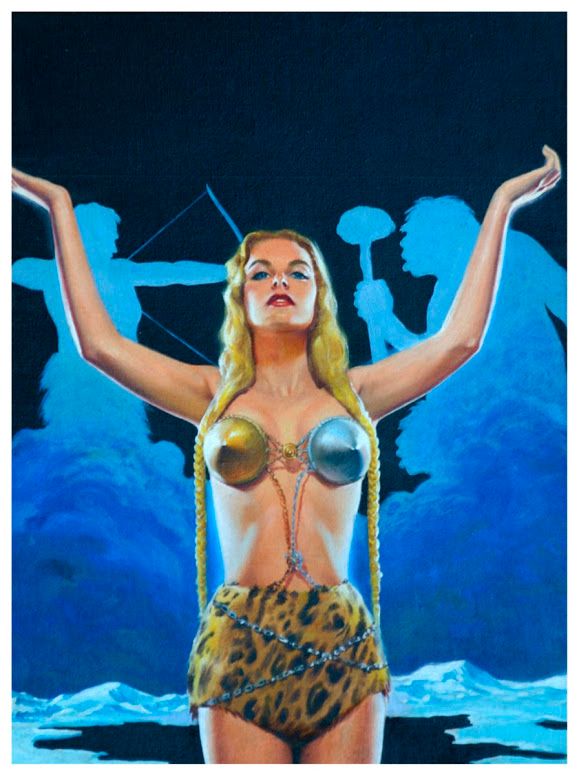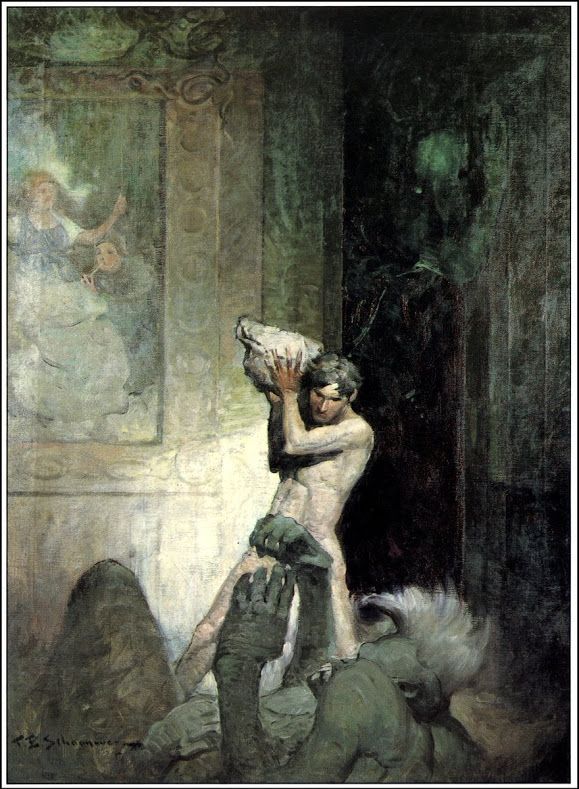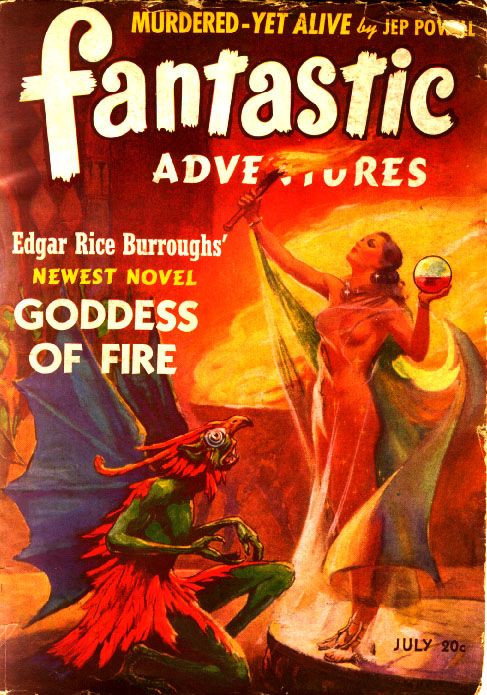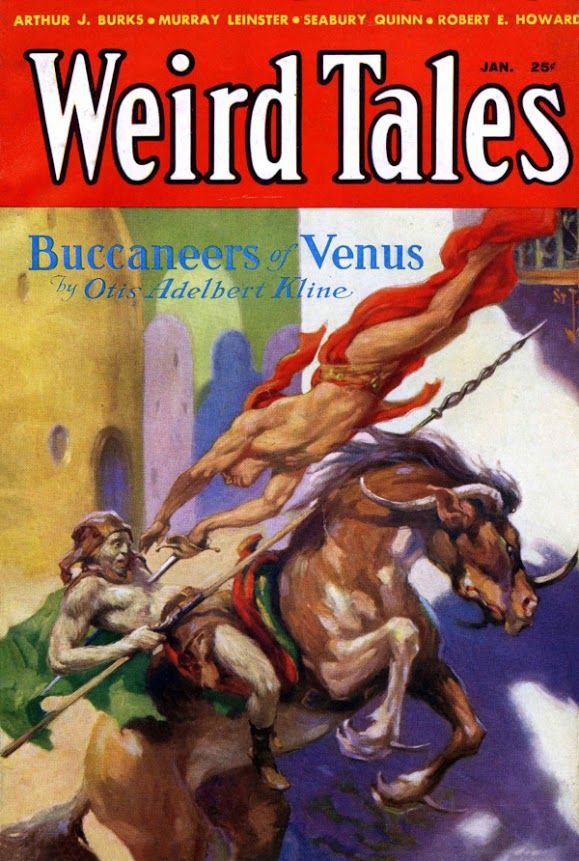SENSOR SWEEP: Clean Limbs, Leaden Eras, Bland Old Dinosaurs, and Insinuating a Background
Wednesday , 31, August 2016 Sensor Sweep 12 Comments Appendix N (Hooc Ott) Tarzan the Cimmerian And Conan of the Apes — “Conan and Tarzan are both clean-(cut)-limbed, black haired, blue/grey eyed, black Irish, super agile, big kitty killing, noble savages made of steal and Iron. Howard and Burroughs use some similar words phrases descriptions, scenarios and reference Plato’s Atlantis. Convincing evidence in my opinion but nothing distinct, original and identical to nail it home with absolute certainty. This was all I had when starting this post. But while writing it I remembered something La of Opar told Tarzan about her people….”
Appendix N (Hooc Ott) Tarzan the Cimmerian And Conan of the Apes — “Conan and Tarzan are both clean-(cut)-limbed, black haired, blue/grey eyed, black Irish, super agile, big kitty killing, noble savages made of steal and Iron. Howard and Burroughs use some similar words phrases descriptions, scenarios and reference Plato’s Atlantis. Convincing evidence in my opinion but nothing distinct, original and identical to nail it home with absolute certainty. This was all I had when starting this post. But while writing it I remembered something La of Opar told Tarzan about her people….”
That Terrible Wordsmith (Atlas Obscura) Essential Guide to Living Lovecraft: The Real World Locations Behind the Horror — “Lovecraft took inspiration from his historic New England surroundings and beyond to create tales of otherworldly standing stones, hidden cities older than time, and simple homes that exude unknowable evil. Lovecraft’s prose placed a distinct emphasis on the power and mystery of location, taking time in each of his stories to create a rich sense of place where his otherworldly gods and tentacled horrors could thrive, sending both his characters and his readers into madness.”
Television (Geek & Sundry) D&D Legend Wants to Run Game on Stranger Things — “These young actors did a fabulous job. They seem to love the D&D game… but they’re young, have very probably never experienced the Original game, and may not be D&D fans at all! Newer versions are rather rules-heavy by comparison (popular in the current market of course). I’d like to show not only the actors but any & all other interested production folks what a real old-style D&D game is really like — fast and engaging, with very few hard-and-fast ‘rules’.”
Television (Misha Burnett) First Impressions — “Now, some or all of these characters might be decent people, but it seems to me that the writers went out of their way to introduce them to the audience at the worst possible time. I don’t get that. For me, the most important part of any story is the people that it happens to. As a writer, I want my audience to form a relationship with my characters. I consider a character’s first appearance to be comparable to a first date with the audience, or a job interview, or a sales call. I want to give my characters every advantage and bring them onstage on their best behavior, well dressed, and in a positive frame of mind.”
The Canon (Black Gate) Straight On Till Morning — “The first book I clearly remember reading was the unexpurgated Twenty Thousand Leagues Under the Sea. Its portrayal of Captain Nemo as a swashbuckling polymath certainly influenced my decision to become a research scientist. But the story, hands down Verne’s best, also irrevocably inclined me towards science fiction (SF; fantasy was already in my blood courtesy of my people’s myths, songs and aeons-long history). By cultural background and temperament, I disliked the Leaden… er, Golden SF Era. I preferred the Silver Age and the New Wave, with their explicit charters to write worlds and characters with more depth and flavor than cardboard. Not Asimov, Clarke and Heinlein, but Anderson, Butler, McIntyre, Scott, Jablokov, Zelazny, LeGuin.”
Mythic Misogyny (Aeon) The struggle of women in science is written in the stars — “To this day, astronomy remains one of the only scientific fields that relies so heavily on ancient Greek and Roman mythology for its naming conventions. Cosmology and mythology have been interwoven throughout human history, so it’s not surprising that modern-day astronomers have inherited this tradition. But classical mythology is deeply misogynistic, and using it to identify celestial bodies contributes to a scientific culture that diminishes the achievements of women like Caroline. Male deities and figures reign with nearly unlimited power, while their female counterparts suffer violence and humiliation.”
Appendix N (Every Day Should Be Tuesday) Throwback SF Thursday: Pirates of Venus by Edgar Rice Burroughs — “Getting the minutia right but failing to account for a large, important variable? It happens. The point is that it’s almost hard science fiction. That’s a good thing in my book not because I care about the science—which even if it was cutting edge at the time is certainly long since out of date and proven wrong—but because it’s good worldbuilding. Burroughs doesn’t take even the first step for granted. This is a problem with some of the newer Retro SF. The authors know the science is moot and assume readers who are going to pick up something like that don’t care so they wind up treating it in a way that’s silly and, worse, boring.”
 D&D (Don’t Split the Party) What Do You Mean, ‘What Is It For?’?! — “Look at Ravenloft and imagine that none of the wights or vampires can level drain. Think about the implications, then. Huh. Now it is just a simple hit point slog, isn’t it? Hit Strahd, wound him, keep that up until he has to go gaseous, then look around. Repeat until you get him another way or until you find his coffin, then kill him ‘for real’. Ho-hum. But with level drain Ravenloft is far from ho-hum. You must avoid a battle of attrition for one simple reason; Level draining largely takes attrition off the table as a viable plan.”
D&D (Don’t Split the Party) What Do You Mean, ‘What Is It For?’?! — “Look at Ravenloft and imagine that none of the wights or vampires can level drain. Think about the implications, then. Huh. Now it is just a simple hit point slog, isn’t it? Hit Strahd, wound him, keep that up until he has to go gaseous, then look around. Repeat until you get him another way or until you find his coffin, then kill him ‘for real’. Ho-hum. But with level drain Ravenloft is far from ho-hum. You must avoid a battle of attrition for one simple reason; Level draining largely takes attrition off the table as a viable plan.”
Appendix N (Rawle Nyanzi) The Face in the Frost — “The journey itself plods along without purpose; it is just one event after another, with nothing connecting them and absolutely no engaging characterization. It is difficult to care about a plot that doesn’t exist, and the book’s attempts at humor did not help things at all. Reading this book is more torture than enjoyment.”
Fixed That For You (Wired) Spinning Lovecraft into a Feminist Dream Quest — “All of the dreamers are men, all of the gods are men. … So I really wanted to think about that. What does it mean to have a world where everything is male? I didn’t realize until after I had written it that these whimsical gods that change things all the time almost exactly map on to how it would have been for women in the ’30s—that they can shut down your college, they can beat you to death and not get arrested for it, they can do all these terrible things, they can take your goods and leave you destitute. … All the different, practical ways that men would rule women’s lives, and it all is mapped into the Dreamlands, where whimsical gods make things happen, and everybody else has to just cope, has to work around their bad days, or their need for rest, or their petty rivalries.”
Game Design (Inside GMT) The Pendragon Chronicles — Vol. 1 — “Now, Britannia is a fantastic game that I have played extensively over the years, but I think that its historical model is quite outdated, owing more to the Victorian era’s paradigm of decadence and invasion than to the complex and nuanced views put forth by modern scholarship.”
Don’t Read Anything Before 1980 (Black Gate) The Women of Andre Norton’s Witch World — “This is what I would call a ‘happy ending’ in the traditional sense, and I have to say that I remember a feeling of satisfaction when I first read this book as a young girl. Of course, then, I identified with Simon, and in nice Hollywood endings, the hero gets the girl as a reward for all his hard work and the horrors he’s had to face. It’s as an adult that I wonder, what’s in this for her?”
Pulp Revolution (The Omega Crusade) The Pulp Fiction Renaissance Continues — “I believe that we are in the early dawn of a new golden age of Science Fiction and Fantasy writing. Cirsova is certainly one of the brighter rays of that future burning through the gray shroud that has, for far too long now, dulled the skies of our beloved genres.”
Movies (PC Bushi) Steve McQueen, Jack Vance, and Revenge — “Last week I decided to watch something light on Netflix and decided to knock Nevada Smith off my list. This one is a western from 1966, starring Steve McQueen as half-Indian Max Sand as he quests for revenge. That’s not so unusual in and of itself, especially for a western. But man, immediately I thought to myself – ‘Holy cow, this is the Demon Princes writ-small, except in the Wild West!’ And only two years after the publication of Star King!”
A Soul Crushing Lack of Enthusiasm (Seagull Rising) Two Panels Diverged — “Listening to these two panels back to back was enlightening just because of the contrast it provided between the two camps. It showed beyond any shadow of a doubt what the ultimate effects of Convergence are on a company, and industry, and a culture. One the one hand you have grizzled and bland old dinosaurs desperate to hang onto positions of influence, and to use that influence for political purposes. On the other hand you have energetic and excited idea-men who just love fantasy and sci-fi, and who just want to learn from the old masters and take their ideas in brave new directions.”
 Pulp Revolution (Chris the Story Reading Ape’s Blog) New Wave Science Fiction: An Introductory Syllabus By Author Misha Burnet — “When I am asked to describe my work in terms of genre, I usually say ‘Science Fiction’, but I have to go on to explain that it may not be the sort of Science Fiction that most people are familiar with. I consider myself firmly in the New Wave Movement, which unfortunately peaked nearly a half century ago in the 1970’s. Consequently modern readers who are familiar with what I call ‘Post-Star Wars Sci-Fi’ often expect something very different.”
Pulp Revolution (Chris the Story Reading Ape’s Blog) New Wave Science Fiction: An Introductory Syllabus By Author Misha Burnet — “When I am asked to describe my work in terms of genre, I usually say ‘Science Fiction’, but I have to go on to explain that it may not be the sort of Science Fiction that most people are familiar with. I consider myself firmly in the New Wave Movement, which unfortunately peaked nearly a half century ago in the 1970’s. Consequently modern readers who are familiar with what I call ‘Post-Star Wars Sci-Fi’ often expect something very different.”
Appendix N (Every Day Should Be Tuesday) Throwback SF Thursday: Old Venus, edited by George R.R. Martin and Gardner Dozois — “So how does Old Venus stack up to old Venus? First off, there is only one story in Old Venus that really runs in the Burroughs vein (not by accident my favorite), so maybe I didn’t pick the best book to compare and contrast. None of the stories are outright bad, but they lack that spark of vitality that Pirates of Venus has.”
Pulp Revolution (The Frisky Pagan) The pitfalls of worldbuilding — “Now, a little worldbuilding is necessary if you want your reader to believe the characters live in a real, even if nonexistent, world. But there is a difference between insinuating a background world (which is what the pulps did) or building a believable setting, and sperging about all the kings and forests (and how many battles were fought there) of a certain unpronounceable fantasy kingdom.”
Books (Cosmic Antipodes) Serial Epic Fantasy? — “I don’t think my problem is with the novel, exactly, but with the subgenre in general, or maybe with myself. There was a time when I ate epic fantasies up. The thicker the better. But I realized one day that the particular series I was reading at the time wasn’t going anywhere, and that there was no reason the author couldn’t keep spinning them out forever. What got me started reading doorstops and paper weights was, of course, The Lord of the Rings. But LOTR had three things that these others lacked: a beginning, a middle, and an end. It had a sense of wholeness, of completeness. And that’s rare in the subgenre called epic fantasy.”
Books (Black Gate) Lyonesse: Suldrun’s Garden by Jack Vance — “One of the worst things about much contemporary writing is its inability to separate itself from our current mindset. Our own ancestors a thousand years ago thought about the world in very different ways than we do. Too often stories are written to cater to our modern concerns, and don’t convey the alienness of the past. Characters will react to events like they had stepped right out of today, with the same attitudes about social mores, politics, life, the universe, and everything.”
Books (Cedara Writes) Tickyboxes — “So many books get recommended these days that I start and cannot stand by the end of the first chapter, if not before. If your lesbian heroine has made a name for herself without the inheritance stolen by her brother by virtue of his maleness, and now must save her patriarchal family from the mistakes of the males I am done. If your soldier is fighting the evil corporations because all business is evil, I am done. If your station manager must save the station from attacks by the evil white male mercenaries while her ineffectual male co-workers piss themselves, I am done.”
 The Other Big Three (Ominous Octopus Omnibus) Tarzan, Superman, And Renfrew Of The Mounted Meet — “It is sad to have to disillusion those Jap spies, but the meeting of these three masters of stupendously powerful characters didn’t signify anything at all. Superman was officially classified as 4-F, believe it or not. Renfrew is retired for the duration while the Major does some pretty strenuous work himself. Tarzan, so far as is known, is still up a tree in Africa. That makes none of them available for active service.”
The Other Big Three (Ominous Octopus Omnibus) Tarzan, Superman, And Renfrew Of The Mounted Meet — “It is sad to have to disillusion those Jap spies, but the meeting of these three masters of stupendously powerful characters didn’t signify anything at all. Superman was officially classified as 4-F, believe it or not. Renfrew is retired for the duration while the Major does some pretty strenuous work himself. Tarzan, so far as is known, is still up a tree in Africa. That makes none of them available for active service.”
D&D (Pulsipher Game Design) Experience versus Training in RPGs — “I always thought one of the dumbest rules in early versions of D&D was the requirement that when you reached enough experience points to rising level you had to pay somebody an exorbitant sum to ‘train’ you to be able act at the new level. It was dumb from a gameplay point of view, because if applied as written it turned adventurers into money grubbers in order to acquire enough money for training. It was also dumb because if you have done the things that enabled you to survive and prosper then why would you need somebody to train you?”
D&D (Don’t Split the Party) Leveling Up: I Do It Weird — “And, of course, there are those mentions from Appendix N – Sheelba of the Eyeless Face and Ningauble of the Seven Eyes. The mentors of Fafhrd and the Gray Mouser. Mentors who send them on (sometimes ridiculous) quests but are sources of valuable insight. Sometimes. There is also the woefully neglected (except by Mischa Burnett) book And The Devil Will Drag You Under by Chalker. Part of the novel (which involves inter-dimensional travel) occurs in what appears to be a clone of the City of Greyhawk. Yes, really. While there a protagonist goes to the extremely professional thieves’ guild for specialized equipment and training.”
Pulp Revolution (Misha Burnett) Some Notes Towards A Meta-epistemological Manifesto — “In particular the division of Science Fiction from Fantasy has always bothered me. One must have either a world of rules or a world of magic, but not both. Determinism or Existentialism. There was no such division in the Weird Tale, and there was neither Determinism nor Existentialism. Instead there was the sense of Order Interrupted. The Universe does and should make sense, but it does not do so of its own accord. Instead, it must made to be reasonable, it must be mastered. The heroes of a Weird Tale may fail in their efforts to impose Order onto Chaos, but that effort must be both necessary and laudable.”
Traveller (Tales to Astound) Prepping for my Classic Traveller Convention Game–A Character Sheet and 24 Pregen Characters — “I thought about going an easy route and writing up the characters on index cards–the way it used to be done! But I wanted something a bit fancier to pull the Players into the game. I also wanted clear labels for the “pieces” of the Player Characters, so the Players could know what each one was easily. (Simply running the six characteristics into a string wasn’t going to do. I’d have to keep telling them what each number meant.) So I decided to build something similar to the Character Sheets that GDW created to look like TAS Forms. However, I wanted something simpler and stripped down.”
Traveller (Ancient Faith in the Far Future) Why are there no Ranks in the Scout Service? — “Scouts that are really scouting the uncharted regions have to endure long stretches of isolation with a small group. You’d better be able to ‘play well with others’ in such circumstances. The astronaut Mann in the film Interstellar is an example of the Scout type that ‘sometimes broke.’ While the ‘laconic scout’ trope is popular, if we take this story as source material, the key personality trait for Scouts should be a willingness to collaborate – maybe Liaison skill should be retrofitted into the Scout’s skill tables?”
Many good classic SFF/new wave blogs cropping up recently. I’d wager you’ve played a not inconsequential role in inspiring it, Jeffro.
-
Assuming mine is one of the good classic SFF/new wave blogs – I’m only convinced of the latter three qualifiers – I can confirm that without Jeffro, I wouldn’t be blogging about this stuff.
Apparently in the 30’s men could beat women to death and not get arrested for it. Who knew?
The “I loved this as a kid, BUT NOW THAT I’M OLDER” posts are always such downers. It must be terrible to no longer be able to enjoy the things that inspired you so much.
Thanks for the link
Terrific sweep, so many things to read and ponder (and a few to shake my head over). I’ve read six Witch World novels and some of them are great. The short collections are even better. Thanks for the shout out re: Lyonesse.
Thank you for linking. The Face in the Frost was such a bore, especially coming right after Poul Anderson.